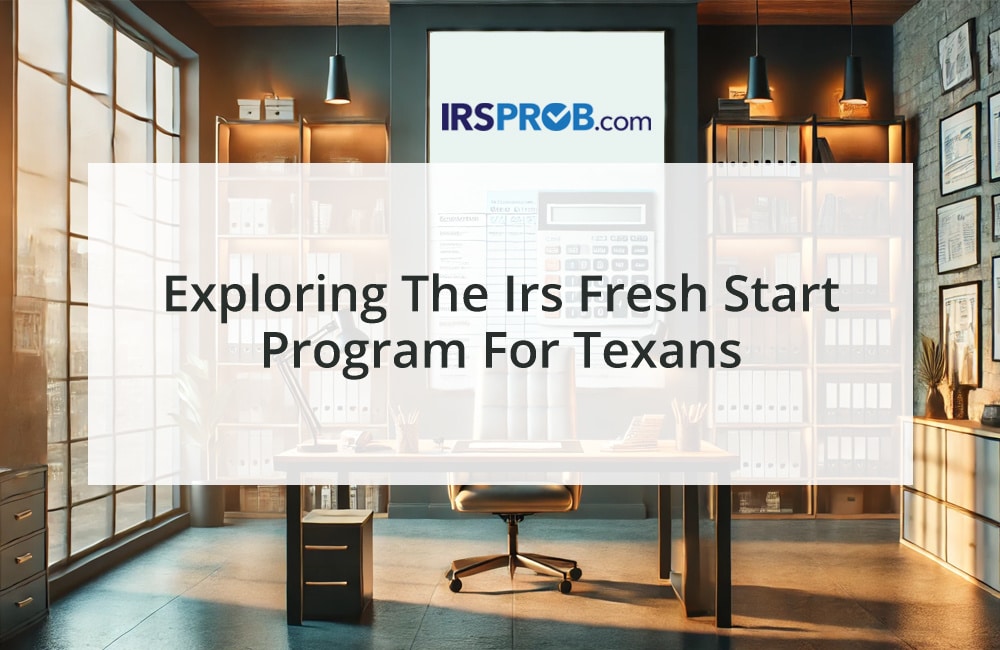How to Avoid Common IRS Penalties: A Texas Taxpayer’s Guide
For many Texans, the idea of dealing with IRS penalties is as daunting as the vast Texas landscape itself. However, with the right planning, strategic actions, and an in-depth understanding of tax regulations, you can effectively sidestep many of these common pitfalls. This guide is designed to help Texas taxpayers navigate the maze of IRS penalties and to provide a clear blueprint for maintaining compliance while minimizing potential financial missteps. Whether you are filing your first return or juggling multiple tax obligations, understanding how to avoid IRS penalties is essential for keeping your financial house in order.
Understanding IRS Penalties in Texas
IRS penalties are not just arbitrary fees; they are the result of non-compliance with tax laws. In Texas, as elsewhere in the United States, the IRS imposes penalties for various infractions, such as late filing, underpayment of taxes, inaccuracies in reporting, and even negligence. Texas taxpayers need to be particularly aware of these penalties given the state’s unique economic and demographic landscape, which sometimes leads to heightened scrutiny from both state and federal tax authorities.
In this section, we will examine the different types of penalties that can occur, including late-filing penalties, late-payment penalties, accuracy-related penalties, and fraud penalties. By understanding the causes and consequences of these penalties, Texas taxpayers can better prepare for tax season and avoid costly mistakes that lead to IRS enforcement actions.
Moreover, understanding your rights as a taxpayer is crucial. The IRS provides various opportunities for penalty abatement and relief, provided you can demonstrate reasonable cause. For Texas residents, maintaining clear documentation and effective communication with tax professionals can be the difference between a manageable situation and a financially damaging penalty.
Identifying Common IRS Penalties Faced by Texas Taxpayers
Texas taxpayers frequently encounter a range of IRS penalties, each with its own set of triggers and consequences. One of the most common issues is the failure to file returns on time. The IRS imposes steep penalties for late filing, and in some cases, these can compound to an overwhelming burden if not addressed promptly.
Another frequent penalty is related to underpayment. Even if you file your return on time, if you fail to pay the full amount of taxes due, you may find yourself subject to a penalty. Underpayment penalties can accumulate quickly, making it crucial to estimate your tax liability accurately well in advance of the due date.
Accuracy is also paramount. Errors in reporting income, deductions, or credits can lead to accuracy-related penalties, often referred to as negligence or substantial understatement penalties. In Texas, where diverse sources of income and complex business structures are common, accuracy in tax return preparation is especially important.
Setting up an installment plan with the IRS when you can’t pay in full on time can often reduce the likelihood of additional penalties. However, failing to follow the installment plan’s terms can lead to further penalties and interest charges. It is essential for every taxpayer to understand these common pitfalls, especially with a focus on the keyword “avoid IRS penalties texas guide” in mind.
Maintaining Accurate Records and Documentation
Keeping well-organized records is the cornerstone of avoiding IRS penalties. The IRS expects taxpayers to maintain thorough documentation to substantiate income, deductions, credits, and other claims made on tax returns. In Texas, where many residents operate both personal and business finances, the importance of proper record-keeping cannot be overstated.
Effective documentation starts long before tax season. It involves routinely tracking expenses, maintaining receipts, and recording all financial transactions. Accurate records not only help you prepare accurate tax returns but also serve as a critical line of defense in the event of an audit. Consider investing in digital accounting software or an organized filing system to keep track of all necessary records.
Moreover, in situations where the IRS questions your return, having a well-maintained documentation trail can lead to penalty abatement. Many penalties can be mitigated or waived entirely if you can demonstrate that errors were due to reasonable cause rather than negligence. In this “avoid IRS penalties texas guide,” taxpayers are encouraged to adopt proactive record-keeping practices as an integral part of their financial management strategy.
Proper Tax Filing and Payment Practices
The process of filing and paying taxes is one of the most critical steps in avoiding IRS penalties. Filing your tax return on time is not just a regulatory requirement; it is a shield against penalties. Many Texans have faced penalties simply due to missing deadlines, often because of procrastination or misunderstanding the tax calendar. Ensuring that you know and meet all deadlines is essential in this guide to “avoid IRS penalties texas guide.”
One effective practice is to plan your tax filing well ahead of the deadline. Gathering all necessary documents, organizing your records, and consulting with tax professionals well in advance will help minimize errors and oversights. Additionally, if you anticipate any issues that might delay your filing, consider requesting an extension from the IRS. However, remember that an extension to file is not an extension to pay; you are still liable for any estimated taxes owed.
When it comes to payment, employing methods such as electronic funds transfer can help minimize errors and ensure that your payments are received on time. Setting up automated payments is another strategy that can protect you from inadvertent delays. Furthermore, if you encounter financial difficulties, proactively communicating with the IRS to arrange a payment plan can prevent the cascade of additional penalties and interest charges.
Dealing with IRS Notices and Audits
Receiving a notice from the IRS can be alarming, but it is not necessarily an indication that you will face heavy penalties. Many IRS notices are administrative in nature and are intended to correct minor discrepancies or request additional information. However, it is essential to address these notices promptly and thoroughly to prevent further complications.
If you receive an IRS notice, the first step is to carefully review the communication and understand what the IRS is asking for. Ignoring these notices rarely makes the problem go away and can result in severe escalations, including fines and additional assessments. Consider seeking the counsel of a tax professional to help interpret the notice and determine the best course of action.
Audits are another area where taxpayers often stumble. While audits can be intimidating, proper preparation can make the process smoother. It is advisable to review past tax returns, ensure that all documentation is in order, and be ready to answer questions about your financial records. This “avoid IRS penalties texas guide” stresses that transparency and openness during an audit can often lead to more favorable outcomes.
Utilizing Professional Tax Assistance
While many taxpayers attempt to navigate the complexities of the IRS on their own, engaging with a professional tax advisor or CPA (Certified Public Accountant) can be a wise investment in avoiding penalties. In Texas, where the tax code is as nuanced as the state’s diverse landscape, professional guidance can help you interpret regulations, maintain proper documentation, and file accurate returns.
Tax professionals are not only well-versed in federal tax laws but often understand the unique local nuances that can affect your tax situation. They can serve as your advocate in communications with the IRS, negotiate on your behalf if issues arise, and offer strategies to ensure that you remain in compliance with all tax obligations. This strategic partnership is a crucial element of an “avoid IRS penalties texas guide” for any taxpayer looking to secure their financial future.
Moreover, a knowledgeable tax professional can help you implement strategies for tax planning that minimize your liability. Whether it’s advising on retirement contributions, investment decisions, or business expenses, their expertise can lead to substantial savings while keeping you firmly on the side of tax compliance.
Understanding Texas-Specific Tax Considerations
Texas is unique not only for its size and culture but also for its distinctive tax environment. Unlike many states, Texas does not levy a state income tax, which can sometimes create a false sense of simplicity regarding overall tax responsibilities. However, Texans are still subject to various local taxes, federal taxes, and other regulatory requirements that, if mismanaged, can lead to IRS penalties.
A key aspect that Texas taxpayers often overlook is the interplay between federal tax obligations and local business regulations. For instance, property taxes, sales taxes, and local business taxes all factor into your overall financial planning. Ensuring that you are compliant with all of these various tax obligations will help you avoid conflicts that might invite additional scrutiny from the IRS.
Additionally, many Texas taxpayers are engaged in industries such as oil and gas, agriculture, or technology, each of which has specific tax codes and exemptions. Understanding these industry-specific provisions is essential for minimizing tax liabilities and avoiding penalties associated with misinterpretation of the law. Familiarizing yourself with the local economic conditions, relevant tax credits, and industry incentives is a proactive step in mastering the “avoid IRS penalties texas guide.”
Strategies for Long-Term Tax Compliance
In order to truly avoid IRS penalties in Texas, it is important to adopt a long-term strategy that encompasses both your current tax practices and future planning. Long-term compliance involves more than just meeting deadlines; it requires strategic planning, routine reviews, and a commitment to staying informed about changes in tax law.
A routine self-review process can help identify any discrepancies or potential issues in your tax records before they become a problem. This might include analyzing your tax deductions, verifying that your reported income aligns with your documentation, and keeping abreast of any updates in IRS guidelines or local tax laws.
Another effective strategy is to participate in educational seminars, webinars, or workshops focused on tax compliance. Many Texas community centers, professional organizations, and even the IRS itself offer resources designed to help taxpayers stay informed about new regulations and strategies for minimizing penalties. Incorporating these educational opportunities into your annual financial review can provide you with the latest insights and best practices.
Finally, continuous improvement in your financial management practices, such as utilizing technology for real-time tracking of expenses and income, can significantly impact your ability to remain compliant. Embrace new tools and software that are designed to streamline the tax filing process and reduce human error. In essence, adopting a proactive approach to tax compliance is the best way to safeguard against IRS penalties over the long haul.
FAQ Section: Avoid IRS Penalties Texas Guide
Pro Tips from IRS Prob
Pro Tip #1: Automate Your Records and Payments
Investing in robust accounting software or services that streamline your record-keeping and tax payment processes is invaluable. Automation not only minimizes human errors but also ensures that you never miss a critical deadline. By setting reminders and automating payments, you can consistently adhere to the “avoid IRS penalties texas guide” principles, significantly reducing the risk of incurring penalties.
Pro Tip #2: Engage Regularly with a Tax Professional
Even if you feel confident managing your tax affairs, regular consultations with a tax professional or CPA can provide ongoing assurance that you are in compliance with the latest regulations. These experts can offer tailored advice, assist with filing accurately, and keep you updated on any changes in tax laws that might affect your obligations as a Texas taxpayer.
Pro Tip #3: Maintain Proactive Communication with the IRS
If you ever have doubts or find yourself in a complex tax situation, do not hesitate to contact the IRS or seek professional guidance immediately. Proactive and transparent communication can often resolve issues before they escalate into significant penalties. Always keep documentation of your correspondence, as it may prove valuable should any misunderstandings arise.
Tax compliance is an ongoing process that demands vigilance, organization, and the willingness to plan ahead. By understanding the intricacies of IRS penalties and the unique circumstances that affect Texas taxpayers, you can implement effective strategies to minimize risk and safeguard your finances. This comprehensive “avoid IRS penalties texas guide” provides you with the tools, insights, and actionable tips that are necessary for navigating the complexities of IRS regulations, ensuring that every step of your tax preparation and filing is conducted with precision.
Remember, the key to avoiding IRS penalties lies in proactive preparation, continuous education, and timely action. By following the recommendations outlined in this guide, you can reduce the chances of a compliance audit and avoid the financial repercussions of penalties. Whether it’s improving your record-keeping practices, filing on time, or seeking expert assistance, every effort counts toward achieving a stress-free tax season. In Texas, where financial success is part of the local pride, taking the necessary steps to avoid IRS penalties is not only a responsibility—it’s a pathway to a more stable economic future.
In summary, the road to effective tax management begins with understanding the core principles of compliance and extends through the ongoing application of best practices. Armed with the knowledge shared in this guide, you are better positioned to approach tax season with confidence. Embrace these strategies, leverage professional expertise, and ensure that each tax filing reflects the diligence and care that is essential for financial prosperity in Texas. No matter your situation, the commitment to learning and adjusting your practices is what truly sets you apart in successfully avoiding IRS penalties.
For any Texas taxpayer facing complex tax scenarios, this guide is a vital resource that underscores the importance of diligence, proactive planning, and clear communication with the IRS. It vouches for a disciplined approach to tax management that not only shields you from unexpected penalties but also positions you for long-term financial success. Take control of your taxes today, and rest assured that with the right strategies in place, the risk of incurring steep penalties will be significantly minimized.
Beyond the technical strategies, remember that tax compliance is both an art and a science. The blend of well-organized documentation, consistent filing habits, and the support of trusted tax professionals is what forms a robust defense against any challenges imposed by the IRS. By integrating these practices into your routine, you contribute to your personal financial security—reinforcing your commitment to upholding tax laws while nurturing a healthier economic environment for all Texans.
As you continue your journey toward impeccable tax compliance, revisit this guide periodically to stay updated with any changes in IRS policies or Texas-specific considerations. Tax laws are continuously evolving, and being adaptable is key. Whether you are an individual taxpayer, a small business owner, or part of a larger enterprise, the lessons shared in this article serve as a permanent reminder of the best practices to follow for a penalty-free tax experience.
The landscape of federal and local tax regulations may seem intricate at times, but armed with the insights from this guide and the practical advice provided by industry experts, you can confidently steer your financial matters. Take proactive steps, stay vigilant, and remember that the approach outlined here is not just for the current tax season—it is a lifelong strategy to secure your financial well-being and to avoid unnecessary penalties from the IRS.
Every tax return you file is an opportunity to refine your processes, update your strategies, and build a more resilient framework for managing your finances. Embrace this continual learning process and make adjustments as needed. With the right mindset and the expert tips shared throughout this comprehensive guide, you’re well on your way to mastering the art of tax compliance in Texas and ensuring that your hard-earned money remains in your pocket where it belongs.
Ultimately, whether you’re navigating the first year of tax filing or have years of experience under your belt, the goal remains the same: to avoid IRS penalties and secure a financially stable future. Let the principles and strategies elaborated in this guide serve as a blueprint that you routinely reference and apply in your tax journey. Your financial success and peace of mind are well worth the effort invested in maintaining full compliance with tax laws.
By internalizing the insights from our “avoid IRS penalties texas guide,” you empower yourself to not only meet but exceed IRS expectations. As you move forward, continue to build upon these best practices, and let diligent, informed tax management become your hallmark as a Texas taxpayer.









